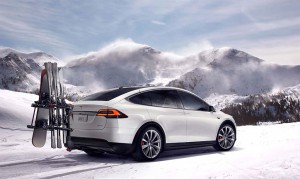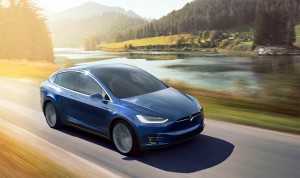Struggling to build sales momentum, Tesla says it will launch a new, lower-priced version of its Model X crossover-utility vehicle. The automaker took a similar step to deliver a more affordable version of its Model S sedan last month.
The move follows news that Tesla had missed both its production and sales targets for the second quarter of 2016 – and as the automaker faces three separate investigations related to potential problems with its semi-autonomous Autopilot system.
But while potential buyers will now be able to purchase a Tesla Model X 60D for $74,000, or $9,000 less than the old base battery-electric SUV, Tesla is doing away with the guaranteed buyback program that covered the Model S sedan, assuring owners they would get at least 50% of the purchase price back after three years.
(CEO Musk: Tesla won’t disable Autopilot despite crashes. Click Here for more.)
As with earlier versions of the Tesla ute, those purchasing the Model X 60D will still qualify for a federal tax credit of $7,500, bringing the effective purchase price down to $66,500 – still well into luxury car territory. Additional state credits may be available, as well.
As the name suggests, Tesla says the Model X 60D will have a smaller lithium-ion battery pack than the previous base version, 60 kilowatt-hours instead of 75 kWh. The maker estimates it will get just over 200 miles per charge, down from 238 for the Model X 75D. That’s still more than double the range of most current battery-electric vehicles.
Curiously, the Model X 60D and the 75D utility vehicles will actually have the same battery packs, the maker only allowing owners to access 60 kWh on the less expensive version. They will later be able to pay to upgrade and use the rest of the pack to add more range.
Tesla says performance for the lower-priced ute will match that of the 75D, with an estimated top speed of 130 mph and a 0 to 60 time of about six seconds.
The most expensive version of the Model X, the P90D, features a 90-kWh battery and can log more than 270 miles per charge. It can also launch from 0 to 60 in just over three seconds when equipped with the optional Ludicrous Mode. But fully equipped, a P90D will run up to as much as $149,000 before federal and state incentives.
(Tesla set to reveal “Top Secret Masterplan,” says Musk. Click Here for details.)
The decision to add a lower-priced base Model X comes just weeks after Tesla revealed it missed both its sales and production targets for the second quarter of this year – though both numbers were up from the first quarter. The shortfall was especially sharp for the battery-ute, reflecting initial production problems and the need to make repairs to a large percentage of the vehicles as they rolled off the assembly line.
Quality problems have been a serious problem for Tesla which has been faulted by a number of owners and seen harsh criticism from traditionally favorable sources such as Consumer Reports magazine.
As with earlier versions of the Model X – and the Model S sedan – the new 60D ute will be equipped with Tesla’s Autopilot technology. The semi-autonomous system has caught at least partial blame for a fatal May 9 crash in Florida and has been blamed by owners for two more recent accidents.
That has triggered separate investigations by both the National Highway Traffic Safety Administration and the National Transportation Safety Board. A third probe, by the Securities and Exchange Commission, is looking into Tesla’s decision to delay public acknowledgement of the Florida crash for two months, until after a $2 billion stock offering.
(For more on the SEC probe, Click Here.)
CEO Elon Musk has downplayed the significance of the crash on Tesla’s finances and has also said the maker will not disable Autopilot, despite calls from some safety advocates.
The decision to end the buyback program should have a financial impact for Tesla. Launched in 2013 as a way to assure wary customers that they could make a safe bet on the then-new Model S, it offered a minimum 50% guaranteed value after 36 months.
As of March 31st, the maker’s latest quarterly SEC filing said it had a potential $1.58 billion liability for the program, a figure that had been growing along with its Model S sales.
Over the next 12 months, Tesla could be on the hook for more than $192 million if owners of 4,209 qualified vehicles were to force the carmaker to take back their sedans. But it is unclear how many will actual opt for that deal, and Tesla would then be able to recoup some of the cash by reselling the vehicles itself.



